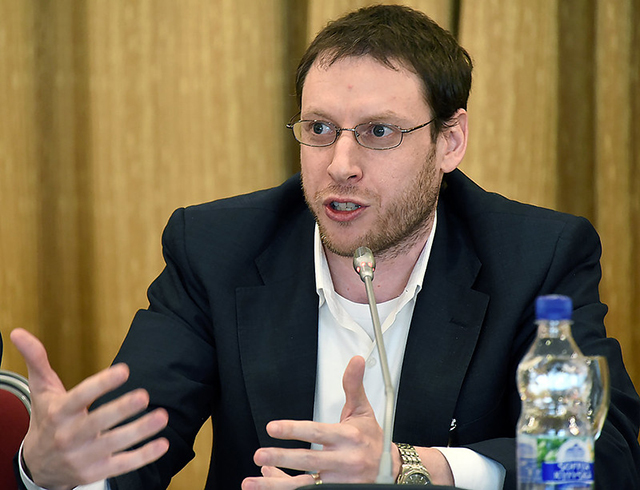Faculty Spotlight: Jordan Gans-Morse
Discovering the causes of—and solutions to—corruption in government
Get all our news
When I first started working on Ukraine, there was a serious and palpable difference in terms of the way Western researchers responded to information and research on Ukraine, compared with Russia … suddenly now, everyone cares about Ukraine, and unfortunately, for very sad reasons.”

Jordan Gans-Morse at the Marshall Center’s 2017 Black Sea-Eurasia Region Countering Corruption Seminar. (Marshall Center photo by Christine June)
The last time Ukraine dominated the global news cycle after being invaded by Russia in 2014, only one out of six Americans could even locate the country on a map.
But with the White House embroiled in a Ukraine-centric scandal, more Americans might be up to the task than ever before. With that, political scientist and IPR associate Jordan Gans-Morse, who has studied the country, its government, and its relationship with Russia for roughly 20 years, has found his once relatively niche area of expertise directly in the spotlight.
“Never in my wildest imagination would I have expected Ukraine to be at the center of a U.S. scandal,” Gans-Morse said. “When I first started working on Ukraine, there was a serious and palpable difference in terms of the way Western researchers responded to information and research on Ukraine, compared with Russia … suddenly now, everyone cares about Ukraine, and unfortunately, for very sad reasons.”
Understanding corruption
When Gans-Morse began to study political science as an undergraduate, he assumed he would put his expertise to use working for the U.S. State Department. Instead, he ultimately chose an academic career researching corruption in government, authoritarian states, and the rule of law in the wake of the post-Soviet transition to democracy.
According to Gans-Morse, who studied both politics and economics while pursuing a PhD in political science at the University of California, Berkeley, meaningful study of Ukraine and other post-Soviet states necessitates an interdisciplinary approach.
“The dividing line between where the private sector ends and the public sector begins has never been fully clear,” Gans-Morse said. “To me, if you’re going to study these questions, you need to know both economics and political science, you can’t know just one or the other.”
He applied this perspective to his study of how property rights have come under threat from private entities and governments in transitioning countries like Russia, which resulted in his first book, Property Rights in Post-Soviet Russia: Violence, Corruption, and the Demand for Law (2017, Cambridge University Press).
In it, Gans-Morse describes how corrupt governments and their attacks on property rights are not only a threat to the rule of law, but to the economy in general.
“If you don’t have secure property, you’re not going to have the economy grow because why would anybody invest in something that can just be taken away?” Gans-Morse asked.
Fighting corruption
Ukraine, where Gans-Morse taught and conducted research most recently as a Fulbright Scholar in 2016–17 at the National University of Kyiv-Mohyla Academy, has seen its government wage a years-long campaign against that kind of property theft and self-dealing, as he detailed in a recent Washington Post op-ed.
Some of his most recent work seeks to understand what might be the most efficient tools to combat corruption. In a recent article surveying the landscape of governmental efforts in this area, he and his co-authors uncover many questions as well as a few promising avenues for reformers to pursue.
Gans-Morse points to the various solutions proposed for decades, like rotating staff in bureaucracies, but says researchers have only recently begun to produce rigorous evidence about what actually works.
The review has led him to examine the role of the next generation of bureaucrats: “If you’re a young Ukrainian and you get sent by the U.S. government on a fellowship to study in the U.S., does that help break out of these cycles? Does it open your eyes to ways of doing things differently?”
The roots of corruption
In considering the possibility that young people in corrupt states could someday be incentivized by civic altruism instead of their own enrichment, much of Gans-Morse’s current research focus on a central question—what kind of person would serve a corrupt institution?
“When I was doing research on Russia originally, businesspeople were starting to complain by the late 2000s that the young people in Russia didn't want to be business people or bankers, like they used to, they wanted to be government bureaucrats,” Gans-Morse said.
“There’s this compelling question of who, in a place where you know corruption is widespread, wants to go into government? Do they do so idealistically, and then get corrupted inside of the government? Do they do so because they know even early on that the point is to make money illicitly, or is it more complicated than that?”
In his ongoing research, Gans-Morse hopes to answer those questions in service of limiting the predatory behavior of corrupt governments around the world.
In the case of Ukraine, Gans-Morse says understanding the country and its fate as a liberal democracy may be still more important as it stands at the center of conflict between Russia and the West.
“This is one of the major flashpoints on the globe and has been for some time,” Gans-Morse said, “and even after the scandal, I don’t think it’s fully sinking in for people how important this country is to Western interests.”
Jordan Gans-Morse is associate professor of political science and an IPR associate.
Published: November 15, 2019.


